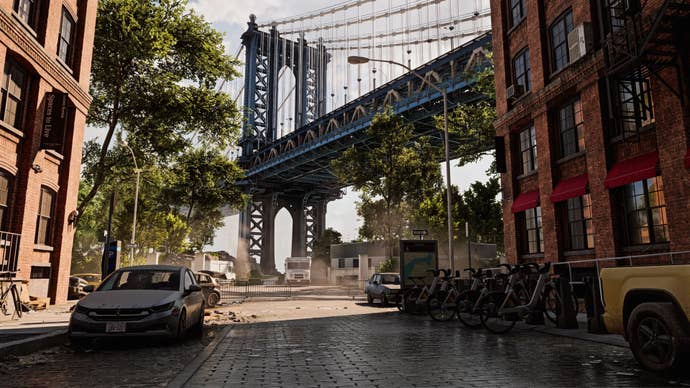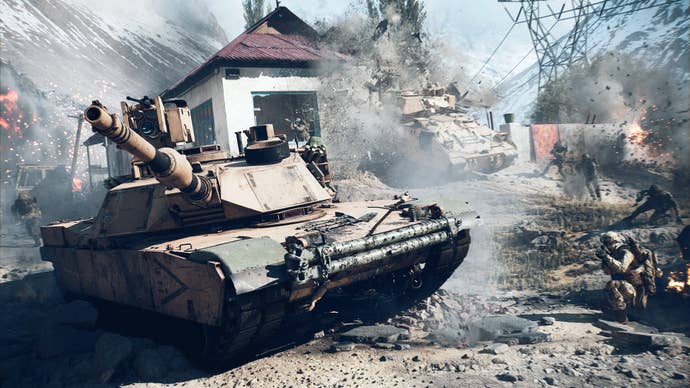I’m not the first journalist to accuse Battlefield 6 of failing to read the room. The new Battlefield’s single player story explores a near-future in which NATO has collapsed, a dastardly private military corporation has filled the power vacuum, and the USA’s somehow-outgunned military must fight to reunite old allies under the Stars and Stripes. The campaign includes an invasion of New York, with street battles waged against the balaclava-huffing scoundrels of “Pax Armata” in the shadow of Brooklyn Bridge. Many valiant helicopters lay down their lives in the process, and the soul of Bob Dylan is flown from every flagpole.
Over at Endless Mode, Moises Taveras comments on the silliness of pitching this particular fable while the current US administration are making noises about quitting NATO unless other members increase their defence spending. Freelance critic Autumn Wright suggests that Battlefield 6 is the latest iteration of a “victimized power fantasy” that dates back to Modern Warfare 2 and before – a xenophobic daydream about being overwhelmed from without that represents an “ever-present fear/kink for a bunch of the worst people”. Bullet Points Monthly co-editor Yussef Cole elaborates in passing that the prospect of being invaded owes something to buried guilt about the extent of the USA’s interventions abroad. Let me follow on briefly and showily from that kink/guilt observation: imagine if a shooter with Battlefield or Call of Duty’s resources said the quiet part loud and just made the USA the villain.
Watch on YouTube
The time is, you could argue, ripe for a game about other nations collaborating to declare some kind of war of liberation. Here’s a possible storyline: let’s assume, just for a moment, that an incoherent megalomaniac has seized the White House by abusing a sclerotic US electoral system, and is now busily issuing draconian laws, enriching his cronies and deploying the military against peaceful protestors, while aiding and abetting slaughter in other countries. It’s up to a heroic alliance of, well, let’s say Mauritius, Ireland and the Swiss to make landfall in Washington and bring down the tyrant, for the sake of all freedom-loving Americans. That’ll be the climax, of course – lot of overseas airbases to get through first.
From a dispassionate raw numbers perspective, the trillion-dollar US military is the ideal antagonist for a real-world first-person shooter of Battlefield’s scale. Look at all the hardware the Pentagon has at its disposal. Missile silos in everybody’s backyard; submarines and carriers just sort of hanging out near distant shorelines, keeping tabs on the shipping. Bunker-buster bombs that can touch the Earth’s core. The absolute most cinematic tactical headgear, all padding and antennae and wraparound shades. Helicopters like they’re going out of fashion. The world’s second largest army by headcount.
The irony of Battlefield 6’s choice of a PMC as villain is that a substantial proportion of real-life PMCs consist of former members of the US military. I’d like to think the developers will get round to exploring that, but the vibe in trailers is more red-blooded outrage at this latest eruption of the Wrong Kind Of Capitalism.

We already know that the USA is a rich repository of potential FPS levels. As Battlefield 6’s trailers make plane, this is a country made up of iconic locations, like the Grand Canyon and Disneyland – a whole continent’s worth of storied backdrops that have been advertised worldwide in movie after movie and, indeed, explored in any number of big budget FPS campaigns, but generally from the perspective of the defending side.
Contemplating the idea of a blockbuster military FPS with the US armed forces as enemy is intriguingly jarring, in that it exposes how much blockbuster shooters rely structurally on the concept of a global war machine. The rapid shifts of time and place you find in Call of Duty and Battlefield campaigns are predicated on infrastructure that can synchronise its parts across thousands of miles. Only a superpower can maintain the gritty surrealism of shoot-outs in which you get a new weapon or gadget every other minute, and call in airstrikes like you’re opening bags of chips.
I write all this and I’m sure it just sounds edgy in an unchallenging and unproductive way. Also hypocritical on many levels, given that I am British and Britain has its fair share of abuser’s guilt, whether you’re talking about our old empire or the war on Iraq. But it’s not quite coming from a place of sneering hot-take-manship. My feelings right now are more tiredness on the behalf of colleagues in the States, measuring Battlefield 6’s delusions of invasion against their government’s brutal treatment of migrants, with some displaced anxiety about my own country’s embrace of prissy, pint-waving bigotry.

I also feel morbid curiosity about the commercial practicalities. I sincerely think that Call of Duty could make bank off a sequel that pitches the USA unambiguously as the enemy. Specifically, the Black Ops subseries. From its Vietnam days to its cyborg phase, Black Ops has gone further than any rival towards suggesting that the US army might be the province of sociopaths. Part of this is that Black Ops is broadly compelled by the nihilism that sprouts in wetwork environments denied by the military world order, where oversight is suspended and, as Assassin’s Creed likes to say, everything is permitted. Nothing makes sense down here, and especially not your superiors.
You could sell an anti-American blockbuster shooter to America as a Spec Ops: The Line-style playable critique of surgical interventions. But probably the way to power it up the charts would be to lean into the inevitable scandalised reaction, take lessons from the likes of Black Sabbath, and anoint yourself as a figure of infamy.







